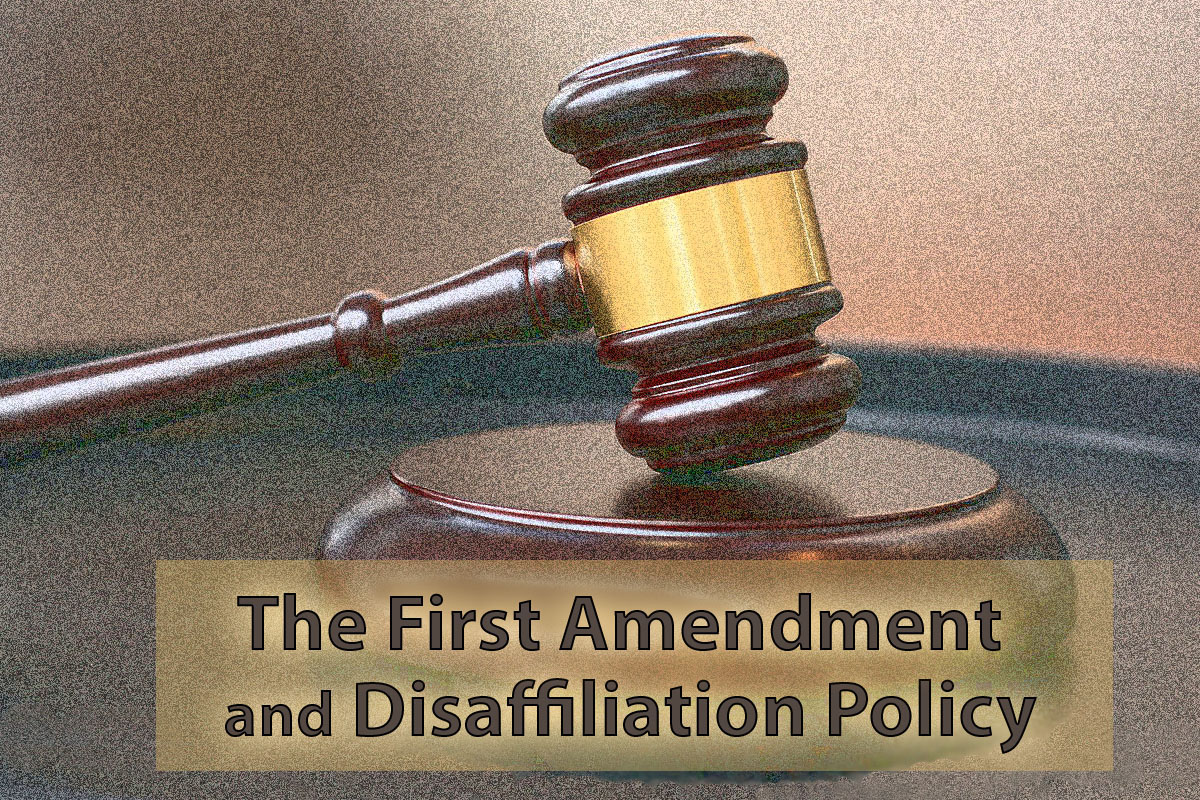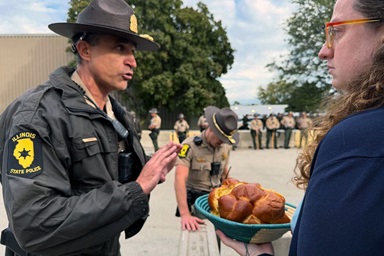Key points:
- The Oklahoma Supreme Court has struck down two decisions by a lower-court judge who sided with churches seeking to exit The United Methodist Church with property.
- The state’s high court ruled that the judge had no jurisdiction in cases that entangle the court in internal religious disputes.
- The Oklahoma rulings could have implications for other cases around the United States dealing with United Methodist disaffiliation rules.
The Oklahoma Supreme Court ruled that a judge had unlawfully interfered in The United Methodist Church’s disaffiliation policies and ordered that she dismiss two congregations’ lawsuits challenging those policies.
The state high court’s two unanimous decisions, released on Oct. 24, represent significant legal wins for the Oklahoma Conference. They also could have implications for other church-disaffiliation cases that have landed in U.S. civil courts.
The two decisions detail the Oklahoma Supreme Court’s reasoning for its Oct. 5 order that a trial court “lacks subject matter jurisdiction” to hear cases involving the denomination’s church-exit rules.
Writing for the court, Justice Dana Lynn Kuehn said a civil court may not “decide for itself what any governing church provisions mean; the review must be strictly secular … .”
The Oklahoma decisions come in the same month a Pennsylvania judge denied a motion filed by 11 United Methodist churches seeking the court’s immediate intervention to help them leave the Eastern Pennsylvania Conference with property.
More on Eastern Pennsylvania case
A Pennsylvania judge’s memorandum shows a similar deference to The United Methodist Church’s self-governance as shown by the Oklahoma Supreme Court.
In that memorandum, Judge Jeffrey S. Saltz was addressing a motion for immediate relief filed by 11 of 50 churches suing the Eastern Pennsylvania Conference and its leadership. Saltz based much of his ruling on how the Judicial Council, The United Methodist Church’s top court, has interpreted Paragraph 2553.
“Because the basis of the Motion is contrary to the rulings of the Judicial Council,” he wrote, the churches making the motion “have not shown a clear right to relief or a likelihood of success on the merits.”
Bishop John Schol, who leads the Eastern Pennsylvania and Greater New Jersey conferences, said conference leaders anticipate the case will be heard next year.
Schol urged prayer for all churches including those suing the conference.
“They remain part of our family,” he said. “Though we may have differences, we are all integral members of the same body of Christ.”
The Oklahoma and Pennsylvania cases basically deal with the same question. Given the U.S. Constitution’s First Amendment, when is it permissible for U.S. civil courts to be involved in church disputes?
The three October rulings offer a similar answer: under very limited conditions.
The rulings come as The United Methodist Church is still grappling with the pain and costs of ongoing church departures expected to continue until the end of the year.
Going back to Methodism’s founder, John Wesley, The United Methodist Church and its predecessors have maintained that church property is held in trust for the entire denomination.
However, after decades of increasing debate and defiance over the denomination’s bans on same-sex weddings and “self-avowed practicing” gay clergy, the 2019 special General Conference approved what is now Paragraph 2553 in the Book of Discipline.
That addition to the denomination’s policy book offers congregations “a limited right” to exit the denomination with property if they meet certain procedural and financial obligations.
The 2019 General Conference made it so the provision only applies in the U.S. The church law also was written to be temporary. It expires on Dec. 31 this year.
The vast majority of exiting congregations have followed Paragraph 2553 without ending up in civil court. Among the provision’s requirements is that at least two-thirds of a congregation votes for disaffiliation and that the departure receives the majority approval of the congregation’s annual conference — a regional body consisting of lay and clergy from multiple congregations.
As of Oct. 28, more than 6,600 congregations have received the required approvals to leave with property. That represents the exit of about 22% of U.S. congregations since Paragraph 2553 took effect four years ago.
Among the disaffiliations approved were six in the Eastern Pennsylvania Conference and 127 in the Oklahoma Conference. Both conferences have no plans to take up any more disaffiliation requests.
That being said, some disputes over Paragraph 2553 have landed in civil courts with sometimes unpredictable results.
Two separate rulings by Oklahoma District Judge Aletia Timmons this summer offer a couple of recent examples.
In July, Timmons ordered the Oklahoma Conference to re-create its April 22 special annual conference session to vote on the withdrawal of Oklahoma City’s First United Methodist Church — the congregation that had filed the suit. Specifically, the trial-court judge ordered the conference to invite back the representatives of churches that had already disaffiliated to vote on First United Methodist’s withdrawal. Such a move would put the conference in direct conflict with the denomination’s Book of Discipline, which requires that annual conference voters currently be United Methodists.
In a similar case in August, Timmons ordered the Oklahoma Conference to administer a third vote on disaffiliation by Oklahoma City’s Church of the Servant United Methodist Church. The congregation held a vote last year that fell two votes short of the two-thirds majority required for disaffiliation. After passing a motion for reconsideration, the congregation held a second vote that also did not cross the two-thirds threshold.
The Oklahoma Supreme Court put both rulings on hold as the Oklahoma Conference took both cases to the high court. Just hours after an Oct. 5 oral hearing on the cases, the supreme court ordered Timmons to dismiss the congregations’ lawsuits. The supreme court also granted the conference’s request for a writ of mandamus, basically ruling that the trial-court judge had “exercised judicial power unauthorized by law.”
In both of its Oct. 24 decisions explaining that earlier order, the high court said it was applying the church autonomy doctrine — the idea that civil courts should stay out of theological or church-governance controversies.
Subscribe to our
e-newsletter
“Church autonomy protects and gives force to the First Amendment freedom of religion clause,” Justice Kuehn wrote.
While courts can apply neutral principles of law to narrow property issues, Kuehn said, that wasn’t what the trial court was doing in the suits against the Oklahoma Conference.
The trial-court’s rulings “clearly show that a Paragraph 2553 disaffiliation cannot be decided without interpreting the Book of Discipline,” she wrote. The claims “are thus inextricably intertwined with church doctrine, and church autonomy applies.”
Whittney Barth, executive director of Emory University’s Center for the Study of Law and Religion in Atlanta, said the Oklahoma decisions are not surprising given long-established precedents that prohibit civil courts from intervening in internal church squabbles. Nevertheless, she added, the recent rulings could be far reaching.
“The court’s strong support for the church autonomy doctrine” as barring courts from hearing a case rather than as just a possible defense in that case “could have implications for future cases, beyond disputes over disaffiliation,” Barth told United Methodist News. “While that distinction may seem technical, it matters in part because a jurisdictional bar signals a heightened deference to religious organizations.”
The Alabama-West Florida, Baltimore-Washington, Florida, Indiana, New England, Susquehanna and Rio Texas conferences also are engaged in legal action involving churches that want to leave with property without following Paragraph 2553 and conference disaffiliation policies.
For their part, members of First United Methodist and Church of the Servant in Oklahoma — both of which argued that their cases involved simple property disputes — shared their disappointment with the Oklahoman newspaper. However, Monica Whitrock, a Church of the Servant trustee, also told the newspaper that church members “are not disheartened in our core mission to support our community and remain dedicated to proclaiming the Gospel wherever we go.”
The Oklahoma Conference agreed with the state supreme court that disaffiliation is an internal church process protected under the Free Exercise Clause of the First Amendment.
But the conference also said in its statement that the case was not just about Paragraph 2553. The case also involved “the rights of 365 local churches and the thousands of members of this annual conference to live out their faith as they see fit through the self-governance of their denomination of faithful believers.”
The conference statement added that as First United Methodist and Church of the Servant embark on their respective futures, “we look forward to continued support and connection with all United Methodist churches in the state, bonded in the common mission of making disciples of Jesus Christ for the transformation of the world.”
Hahn is assistant news editor for UM News. Contact her at (615) 742-5470 or newsdesk@umcom.org. To read more United Methodist news, subscribe to the free Daily or Friday Digests.




